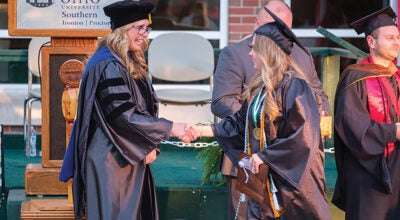ACTC offers Appalachian Studies program
Published 9:58 pm Saturday, November 21, 2009
ASHLAND, Ky. — The Appalachian Studies Program at Ashland Community and Technical College offers a three-dimensional look at the social complexities, people, traditions and creative output of the region.
Since the 1960s and 70s, Appalachia has often been viewed one-dimensionally, with a focus on social and political issues in the context of poverty. The Appalachia explored by the ACTC program has close-knit families, a tradition of hard work, a variety of industries, fine arts centers, first class parks and outdoor recreation areas, according to students in the program.
“People need to know that Appalachia is more than being just a bunch of poor, uneducated hillbillies,” said Jeff Hollingsworth, a respiratory therapy student from Olive Hill.
“The program has a unique way of bringing the past and present together,” said Kandi Conn, a nursing student from Olive Hill. “Being able to explain why certain values and images, both good and bad, are attached to Appalachia will only help future generations preserve our culture and fix the stereotypes.”
“In discussion sessions, I’m learning what I can do to change how people from the outside world see this area,” said Hilary Conley, a nursing student from Flatwoods.
Appalachia, according to the Appalachian Regional Commission, stretches from Alabama to New York and includes portions of 13 states and approximately 25 million people.
The Appalachian Studies Program is a multi-discipline, cross cultural exploration of the history, sociology, culture, economy , environment and politics that give this area it’s unique flavor.
“Many of us rarely step outside ourselves to gain critical perspective about our familiar environment,” said Laura Tussey, program coordinator. “This program lets us explore and affirm the values, customs and expressions that form the foundation and background of our daily lives.”
“Whether or not students intend to pursue further education in Appalachian Studies at area universities, they will benefit from learning more about their culture,” Tussey said.
The Appalachian Studies Certificate offers a way to provide a structure and focus for general education courses. The courses can also be used to partially fulfill the requirements of an Associate in Arts degree.
The program is also helpful to area residents, whether new or native to the area, who are interested in understanding and preserving the heritage of the region.
Kevin T. Campbell, an Ashland resident and pastor of Plaza Church of the Nazarene, plans to use what he has learned both as an area native and as an Appalachian Studies student to help ministers from outside of Appalachia become assimilated to the area.
“I want to help inform, teach, and lessen the learning curve of those who are new to the culture and issues of the region,” he said.
“The program is an eye-opening look into the traditions, heritage and stereotypes of Appalachia,” said Jeanette Wyrick, an accounting major from Enon. “For me, the most interesting part of the courses are the projects that have brought me closer to my family heritage.”
Five options let students focus on specific aspects of the Appalachian heritage: communication, creative writing, music, science and social science.
The communication option examines the complexity of communication in Appalachian culture, the impact language has had within the region and outside of the region, various aspects of communication across cultures, and norms and values in a variety of cultures, particularly in the Appalachian culture.





